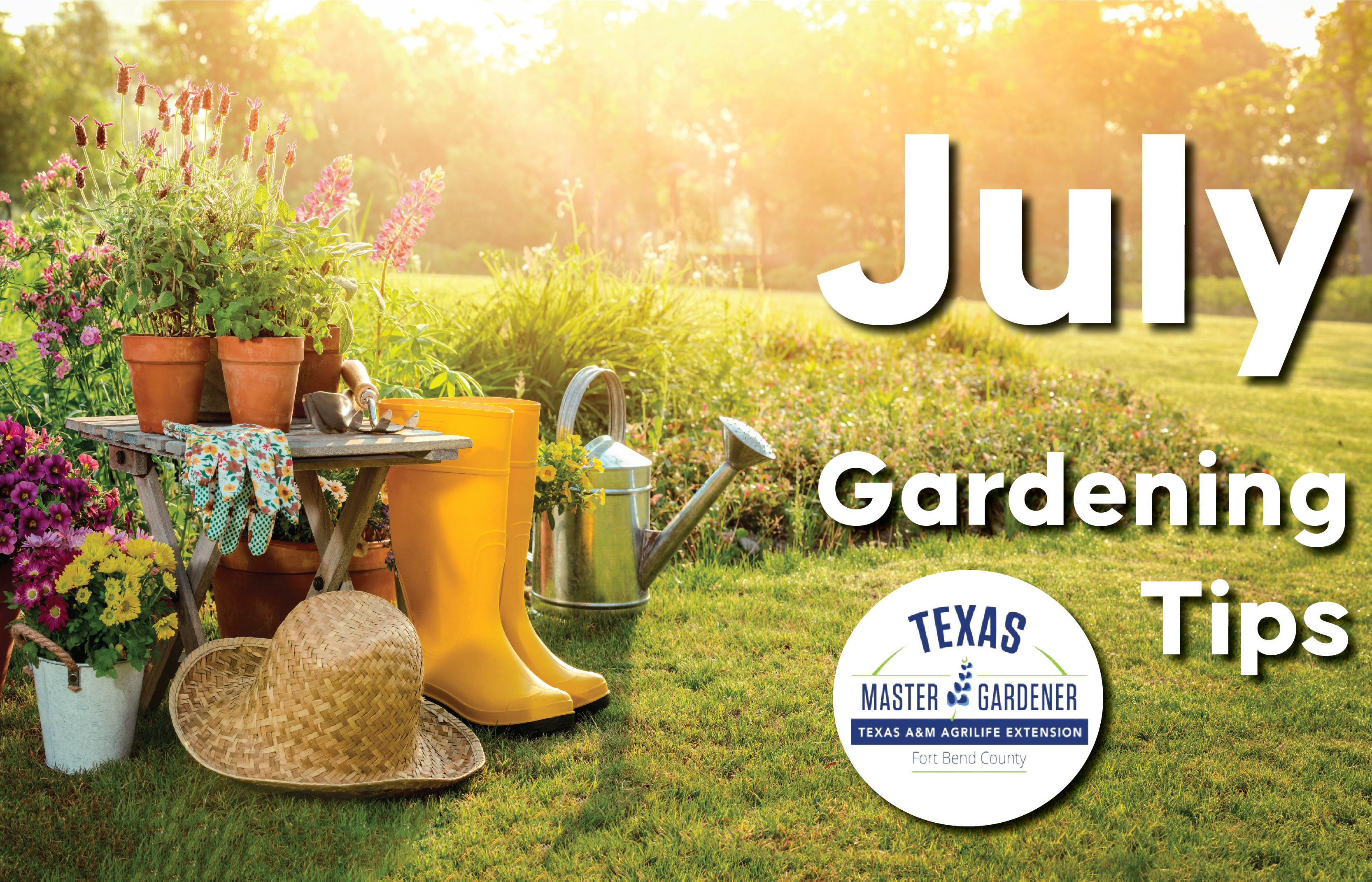
Fort Bend County Master Gardeners Shares July Gardening Tips
This information has been generously provided to Fort Bend County residents free of charge by the Fort Bend County Master Gardeners, an expert group of trained volunteers assisting Texas A&M AgriLife Extension Service in educating the community using research-based horticultural information.
Did you know that the Fort Bend County Master Gardeners offer free training, events and other resources all year round? To learn more, visit fbmg.org.
The summer heat can be oppressive. Still, gardens need gardening. Just take care.
-
First and foremost, stay safe. Drink plenty of fluids, use sunscreen, wear hats and long sleeves and stay out of the midday heat. Older adults and children under the age of two face special risks from extreme heat. Read the Centers for Disease Control and Prevention recommendations for staying safe in the summer heat.
-
Second, protect your pets. They are also vulnerable to summer heat. Learn how to protect your pet from the summer heat from Texas A&M’s School of Veterinary Medicine.
-
Do you have some plants that really struggle with the heat? Make a note of which ones so later (when it is not so hot) you can move those plants to shadier or wetter locations. Use Texas A&M’s garden planner to help you plan or redesign your landscape.
-
If the plants that are struggling from the summer heat is your turf, you may want to replace that area with a drought-resistant groundcover such as creeping rosemary, or liriope. Learn more about groundcovers for Texas.
-
You may want to bring in an irrigation consultant to suggest a more water efficient irrigation system. Consider an irrigation consultant that is certified in WaterSense and specially trained to do irrigation audits. Learn about WaterSense and irrigation audits.
-
If you choose to plant any new plants or lay any sod during this time, take extra care in keeping their roots irrigated. The heat makes establishing new roots more difficult and you would not want to lose your new garden babies.
-
Palms can usually be planted even in the hot summer months. Just be sure to choose a cold-hardy palm so it can continue to thrive when the colder months come.
-
It may be tempting to mow less often but your turf will thrive with more frequent mowing so that no more than one-third of the blades are removed. Learn about mowing recommendations for your particular turfgrass species.
-
Are you one of the many people who do not have a permanent home of your own but still want to put down roots – plant roots, that is? Learn about porta-growing or container gardening. You can have potted gardens that you can take with you wherever you roam.
-
Avoid the heat and work on your houseplants. Learn how to repot those beauties to extend their lives.
-
If you are planning a vacation, how will your plants live without you? Here are some tips for preparing your plants before you go.
-
If you have ant mounds in your yard, use the Texas two-step method to treat them.
-
You may be seeing aphids on some of your plants. Learn some less toxic ways to manage aphids.
-
Don’t forget your local butterflies, birds, squirrels and other critters need water too. Consider putting in a birdbath, bubbler, or fountain to help them with their water needs. However, if you do, remember to change the water frequently so it does not become a site for mosquito larvae. Learn more about adding various water features to your garden.
-
Butterfly bushes (Buddleia spp.) should be trimmed back this month. Other woody shrubs that might need to be pruned include Ligustrum, photinia, pyracantha, and more. Learn proper pruning techniques to preserve the health of your plants.
- Believe it or not, fall vegetable gardening begins in July! This Fall Vegetable Gardening Guide will help you know when to put in different vegetables. Peppers, tomatoes and eggplants should be planted very soon!
July Color in Fort Bend County
Check out the newest Texas Superstar®: Gorizia rosemary. This tender perennial evergreen plant was declared a Texas Superstar in June 2021. It is both an herb and a wonderful pollinator plant with blue blossoms. Look for these welcome features:
- Low maintenance and drought tolerant
- Delicate sky-blue flowers
- Prefers full sun and well-drained soil
- Grows to a height 3-4 feet and width of 30-36 inches
- Plant stems can be used as skewers for grilling
- Tolerant of urban pollution
- Grows well in containers.
For more information about this newest superstar, visit this site.
For more information about Texas Superstar plants, visit texassuperstar.com.
Although some plants will wilt in our summer heat, there are some that really come into their own in these hot summer months. Look to some of these to spice up your garden.
- Firebush (Hamelia patens) : This shrub is typically an evergreen perennial in this area with red trumpet- shaped flowers that blooms spring through frost. Grow it in full sun where it is heat- and drought-resistant and attracts bees and butterflies. It will grow to a height of 3 – 5 feet.
- NuMex Twilight Ornamental Pepper (Capsicum frutescens) : This Texas Superstar® is a showy shrub that grows to about 2 feet tall and wide. The peppers it produces are very hot. The plant is quite showy with glossy green leaves, white blooms, and peppers in a variety of colors.
- Roses (Rosa spp.) : Many roses thrive in the summer. There are several varieties that are Texas Superstars®. Knockout Roses are both Texas Superstars® and Earth-Kind® favorites.
- Spanish Daggers or Yucca (Yucca spp.) : This coarse-textured plant is very drought-resistant and perfect for xeriscaping. It blooms in spring and summer and can have beautiful white blooms on panacles up to 30 feet above the plant. Plant it in full sun, of course.
For more information about the Fort Bend County Master Gardeners’ Demonstration Gardens, visit fbmg.org/demonstration-gardens.
Want to go deeper? Visit the Fort Bend County Master Gardeners' Article Library for a plethora of information about gardening in your region at fbmg.org/fort-bend-gardening/article-library. Contact the Fort Bend County Master Gardeners help desk at fbmg.org/ask-a-master-gardener for assistance with your horticultural needs.







